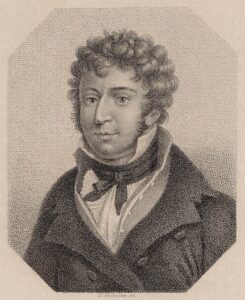Field, Nocturne No. 5 in B-flat Major
 The nocturne is a type of character piece developed primarily by Irish composer John Field (1782-1837). Field’s works had a significant influence on Chopin, the composer perhaps most closely associated with the nocturne. The name denotes night, and a nocturne generally has a soft, lyrical character.
The nocturne is a type of character piece developed primarily by Irish composer John Field (1782-1837). Field’s works had a significant influence on Chopin, the composer perhaps most closely associated with the nocturne. The name denotes night, and a nocturne generally has a soft, lyrical character.
This particular nocturne is typical of Field. It has a single clear melodic line with a somewhat improvisatory feel that is amplified by ornamental figurations. The sophisticated harmonies add to the overall ethereal quality. And while the broken-chord accompaniment provides some rhythmic impetus, the work unfolds at a relaxed pace. The performer uses rubato (meaning literally “to steal”) wherein the tempo is varied slightly in order to bring out certain expressive elements. And it is this expressive quality that ultimately characterizes the nocturne, always with a sad or contemplative mood, not following any set form or plan of development, and appealing directly to the emotions.
Field was apprenticed to Muzio Clementi in London in 1793. He toured Europe with Clementi in 1802, and when the tour culminated in St. Petersburg, Field stayed there perhaps as a way of severing ties with the overbearing Clementi. He lived alternately in Moscow and St. Petersburg and where he was idolized by the aristocracy.
Field receives credit for originating a trend in piano composition contrary to the prevailing ethos of greater virtuosity and power. Instead he emphasized a delicate sensitivity. All of Field’s works include the piano, and he composed many solo piano works in addition to the nocturnes—17 or 18 of them, depending on how you count. The first was published in 1812. No. 5 presented here was published in 1817.



